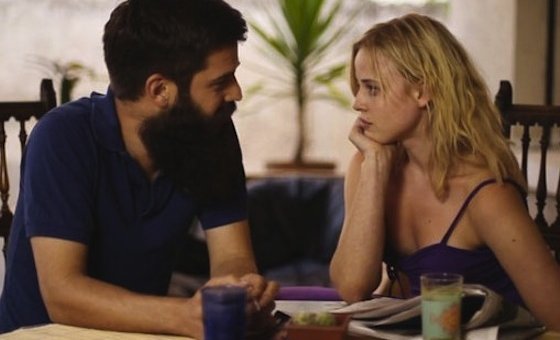Daniel Garber talks with Eric San (Kid Koala) about Nufonia Must Fall premiering at Luminato in June.
 Hi, this is Daniel Garber at the movies for culturalmining.com and CIUT 89.5 fm.
Hi, this is Daniel Garber at the movies for culturalmining.com and CIUT 89.5 fm.
When you’re shaped like a tin can with headphones I see possible troubles. And if you’re in love with a girl who doesn’t have time for silly love songs, what’s a cartoon robot to do? The answers lie in a new performance that combines comics, projected film images, puppets and music — both live and recorded.
what’s a cartoon robot to do? The answers lie in a new performance that combines comics, projected film images, puppets and music — both live and recorded.
It’s called Nufonia Must Fall, based on the graphic novel of the same name. It was created  by Canadian DJ, musician and cartoonist Kid Koala. It’s having its world premier at Toronto’s Luminato festival in June. I spoke to Kid Koala, a.k.a. Erik San, by telephone in Banff Alberta, about Nufonia (its music, design, genesis, inspiration, and technique), nostalgia, K.K. Barrett, found art, Mellotrons, robots, vinyl, “live movies”, imperfection, high tech vs low-tech… and more.
by Canadian DJ, musician and cartoonist Kid Koala. It’s having its world premier at Toronto’s Luminato festival in June. I spoke to Kid Koala, a.k.a. Erik San, by telephone in Banff Alberta, about Nufonia (its music, design, genesis, inspiration, and technique), nostalgia, K.K. Barrett, found art, Mellotrons, robots, vinyl, “live movies”, imperfection, high tech vs low-tech… and more.
Art House Dramas. Films Reviewed: We are the Best, Things the Way They Are, Eastern Boys
Hi, this is Daniel Garber at the Movies for culturalmining.com and CIUT 89.5 FM, looking at high-brow and low-brow movies, indie, cult, foreign, festival, documentary, genre and mainstream films, helping you see movies with good taste, movies that taste good, and how to tell the difference.
With spring comes blockbusters, superheroes and giant atomic lizards. But it’s also spring festival season. Inside out, Toronto’s LGBT festival runs through the weekend, and coming soon are NXNE, with some great movies, spectacular Luminato, the Italian Contemporary Film Fest, and NIFF, a new, integrated festival in Niagara Falls combining movies, food and wine. This week, I’m looking at great festival-type movies: realistic, low-budget, art-house dramas. There are punk girls in Stockholm, a culture clash in Santiago; and, from Paris, a gang of eastern European boys.
 We Are the Best! (Vi är bäst!)
We Are the Best! (Vi är bäst!)
Dir: Lukas Moodysson (Based on the graphic novel by Coco Moodysson)
It’s Stockholm, Sweden in 1982. Bobo and Klara (Mira Barkhammar, Mira Grosin) are two young girls who are mad at the world. Grown-ups are idiots without a clue. Other kids are into aerobics and spandex, or long hair, metal, and prog-rock. So they chop off their hair, make it into spikes or a Mohawk and declare themselves punk. Punk not dead! They embrace punk ideology, clothes and politics, not just the music – everything from questioning authority to garbage picking. They are firmly against nukes, organized religion, and consumerism.
Conformist kids pick on them, and they miss out on school sports and clubs.  So they start off on their own, spontaneously, with a band. Without any music skill. Soon, it’s Bobo on drums and Klara on bass. They’re awful. At the fall talent show, they see Hedvig (Liv LeMoyne), the school pariah and a fundamentalist Christian. Because she plays classical guitar and dresses conservatively she gets booed off the stage. But Bobo and Klara can see she really knows music. So they make her a deal: she teaches them how to play and they’ll be her friend and let her join their band. Though labeled a “girl band” these punks set out to prove they are the best.
So they start off on their own, spontaneously, with a band. Without any music skill. Soon, it’s Bobo on drums and Klara on bass. They’re awful. At the fall talent show, they see Hedvig (Liv LeMoyne), the school pariah and a fundamentalist Christian. Because she plays classical guitar and dresses conservatively she gets booed off the stage. But Bobo and Klara can see she really knows music. So they make her a deal: she teaches them how to play and they’ll be her friend and let her join their band. Though labeled a “girl band” these punks set out to prove they are the best.
This is great movie that captures the early 80s dead-on. The best part? These girls are 10-13 year olds, yet they play the punks flawlessly and carry-off the movie.
 Things the Way They Are (Los Cosas Como Son)
Things the Way They Are (Los Cosas Como Son)
Dir: Fernando Lavanderos
Jeronimo (Cristobal Palma) is an ordinary guy who quietly lives in a huge crumbling house in Santiago, Chile. He makes his money renting rooms to foreigners, and spends all day painting, plastering, and trying to bring the place into livable condition. Jeronimo has a helluva black beard, looking like a cross between an urban hipster and a 19th century anarchist. But his politics are anything but. He wants things to stay exactly the way they are.
Into his life comes the beautiful, young Sanna, a blonde woman from Norway. She’s there to teach drama classes to kids in a poor part of town. But Jeronimo can’t understand why. What does she get out of it? What’s in it for her? And he’s baffled by Scandinavian attitudes toward sex. Women have sex with whomever they want? In Chile, we call them prostitutes.
Sanna’s for openness, trust, change, being free. Jeronimo is suspicious,  class-conscious, homebound. Still, there’s something happening between them. Will love follow? But when Jeronimo, who likes snooping around his tenants rooms, discovers a surprise under Sanna’s bed, that totally changes their situation.
class-conscious, homebound. Still, there’s something happening between them. Will love follow? But when Jeronimo, who likes snooping around his tenants rooms, discovers a surprise under Sanna’s bed, that totally changes their situation.
I liked this movie. It’s attractive to watch, though not exciting. It’s more about contrasting characters, cultures and personal philosophies, giving an intimate slice of life in contemporary Santiago.
 Eastern Boys
Eastern Boys
Wri/Dir: Robin Campillo
Daniel (Olivier Rabourdin) is a blank- faced businessman who regularly passes through the Gare du Nord in Paris. He meets a handsome young prostitute there named Marek (Kirill Emelyanov) and gives him his address for an upcoming tryst. What he doesn’t realize is that Marek is part of a closely-knit gang of guys from Eastern Europe who practically live at the station. They’re hustlers, thieves, pickpockets, conmen, and prostitutes. And the next day, to his horror, they show up, en masse, at his condo door for a “party”. Their leader, known only as “Boss” (Daniil Vorobyov), is the sinister but seductive alpha dog. He puts on music, pulls off his shirt and starts dancing in front of the businessman. Daniel’s non-plussed, but eventually just says to hell with it.  He dances with thieves wearing a paper crown, while they strip his apartment bare. His art, his computer, his TV… everything is loaded onto a white van.
He dances with thieves wearing a paper crown, while they strip his apartment bare. His art, his computer, his TV… everything is loaded onto a white van.
C’est la vie, right? No. Who shows up the next day at his empty apartment but Marek, the sex worker who started it all. He says it wasn’t his fault, and he’s still willing to do what he was hired for. Sex is cold and perfunctory, but he begins to show up regularly, on the sly. He’s emphatic that Boss can’t know. Marek spends his weekends at a remote suburban refugee hotel with the gang, where they hold his passport. Daniel’s life is opaque. But we slowly find out more about Marek. He’s from a war zone and still hears the bombers, gunshots and explosions in the distance. Cold Daniel starts to show some backbone and compassion. Gradually they change from buyer/seller, to lovers, to roommates, to friends… to something very different and unexpected. Can Marek escape Boss’s control and leave the gang for a future in France?
This is a disconcerting and disturbing film, but quite good. What’s remarkable though is the ensemble of Eastern European actors, working perfectly together like Oliver Twist performed by Cirque de Soleil. Though moralistic at times, it works both as a crime thriller (with minimal violence), and as a social drama.
Eastern Boys played at Inside-Out, We Are the Best and Things the Way They Are both open today in Toronto: check your local listings.
This is Daniel Garber at the Movies, each Friday morning on CIUT 89.5 FM and on my website, culturalmining.com
Queer parents, straight kids. Movies Reviewed: 52 Tuesdays, My Straight Son, Open Up To Me PLUS Inside Out LGBT Film Festival
Hi, this is Daniel Garber at the Movies for culturalmining.com and CIUT 89.5 FM, looking at high-brow and low-brow movies, indie, cult, foreign, festival, documentary, genre and mainstream films, helping you see movies with good taste, movies that taste good, and how to tell the difference.
Inside Out, Toronto’s LGBT film festival — known for its innovative programming and great movies – starts today. One traditional sub-genre is the Coming Out movie: a young man or woman finds freedom and love but also faces bullying and depression, when he comes out publicly as gay, bi or lesbian. Usually there are cruel homophobic parents who don’t understand what they’re going through. This always makes for a good movie, but it’s been done a lot. So here’s a reversal: how about movies where the LGBT character is the parent, not the kid? This week I’m looking at three such movies (with an emphasis on trans characters) – from Australia, Venezuela and Finland — all serious dramas, but with good comic relief mixed in.
Dir: Sophie Hyde
Billie is a well-adjusted teenager with a great relationship with her parents. She lives with her mom, but regularly sees her motorcycle-riding dad. But one day, she comes home to a big surprise. Her mom has cut her hair, bound her breasts, and is changing her name to James. Starting today, her mom is becoming her dad! James will be undergoing testosterone treatments in a gender transformation. It’s a big change that will take a year. And during that year, James will need his  space – Billie has to live with her dad (her other dad). Billie is gobsmacked, but doesn’t want to lose contact with her parent. So they agree: she’ll visit after school, each Tuesday, until 10 pm. Over the course of the year, Billie records these weekly visits with her video camera. She also begins to explore gender identity, sexuality… and sex.
space – Billie has to live with her dad (her other dad). Billie is gobsmacked, but doesn’t want to lose contact with her parent. So they agree: she’ll visit after school, each Tuesday, until 10 pm. Over the course of the year, Billie records these weekly visits with her video camera. She also begins to explore gender identity, sexuality… and sex.
At school, she falls in with a passionate couple – Josh and Jasmine (Sam Althuizen and Imogen Archer) – when she spies them making out. They’re in a school production of Shakespeare’s Twelfth Night (where Viola dresses as a man). And, courtesy of Billie’s  uncle, the three of them get their own private time in his empty apartment: Tuesdays from 10 to midnight, when both of Billie’s dads think she’s with the other. And Billie also records these meetings – including their sexual explorations – on her video camera.
uncle, the three of them get their own private time in his empty apartment: Tuesdays from 10 to midnight, when both of Billie’s dads think she’s with the other. And Billie also records these meetings – including their sexual explorations – on her video camera.
So 52 Tuesdays is just as it sounds: 52 short scenes, from Billie’s point of view, tracing the changes – and setbacks – of James’s transformation and her own coming of age. It has a few too many divergent plotlines – school censorship, medical problems, accidents, family rivalries, hidden relationships — extraneous to the main story. But that doesn’t detract from the movie’s elegant structure. Tilda Cobham-Hervey as Billie is a joy to watch – she’s the next Carey Mulligan – and Del Herbert-Jane gives a fascinating and realistic portrayal of James’ transformation.
 My Straight Son (Azul y no Tan Rosa)
My Straight Son (Azul y no Tan Rosa)
Dir: Miguel Ferrari
Diego (Guillermo García) is a professional photographer in Caracas in his thirties. Life is great. He has a successful career, and a boyfriend, Fabrizio, who is a doctor. Fabrizio pops the question one night at dinner in a fancy restaurant. Do you want to live together? Diego’s surprised but inwardly happy. He says he’ll tell him his decision the next day. He plans to say yes, but two big things happen. Diego’s teenaged son Armando (Ignacio Montes) — who he hasn’t seen for five years since he moved to Europe with his mother — arrives at his  doorstep. Armando feels neglected by his dad and baffled by his lifestyle. He retreats to online relationships. He’s good-looking but insecure. He uses a celebrity photo his dad took to create a new, online personality and along-distance relationship with Laura, a small town tango enthusiast.
doorstep. Armando feels neglected by his dad and baffled by his lifestyle. He retreats to online relationships. He’s good-looking but insecure. He uses a celebrity photo his dad took to create a new, online personality and along-distance relationship with Laura, a small town tango enthusiast.
The second thing that happens is Fabrizio is brutally attacked outside a gay bar by three young men who beat him  senseless. And now he lies in a coma in his hospital bed. Diego identified the gay-bashers, but gets no help from the police – so he buys a gun.
senseless. And now he lies in a coma in his hospital bed. Diego identified the gay-bashers, but gets no help from the police – so he buys a gun.
Diego loves his son but doesn’t know what to do. He turns for help from his working class family, and his bar friends – a comic entourage with soap opera names like Dolores Del Rio and Perla Marina. Can Armando connect with his dad? And will he reveal his real face to his online girlfriend? Will Fabrizio come out of his coma? And will the attacking teens ever be brought to justice?
My Straight Son is a very enjoyable melodrama that mixes telenovela plots with pop culture tropes, all with a gay twist.
Dir: Simo Halinen
Maarit (Leea Klemola) lives in Helsinki, where she works as a cleaning woman in an office building. She used to work as a guidance counselor in a small town, but left her spouse and teenaged daughter following sex-reassignment surgery. While cleaning an office one day, a psychologist tells Maarit to lock up when she’s done — she’s going to Spain for a few weeks. Two weeks! Hmm… So she tries on her make up and perfume and lounges about the office. Into the psychologist’s office walks Sami (Peter Franzén), a gym teacher and soccer coach. Sami has an appointment to talk about sex problems with his wife, also a school teacher. He  mistakes Maarit for a therapist. After a moment’s pause she slips easily into the role – and they both notice a spark between them. They arrange to meet again.
mistakes Maarit for a therapist. After a moment’s pause she slips easily into the role – and they both notice a spark between them. They arrange to meet again.
Soon, Maarit comes clean: she’s a cleaner not as a counseler. She reveals that they met, 20 years ago. Maarit, as a man, was on a professional soccer team (as was Sami) and he bested Sami at the national championships. Sami is taken aback, but  intrigued. Is this a budding relationship?
intrigued. Is this a budding relationship?
Maarit goes back to her home town where vicious rumours are spreading about her, and her daughter is being picked on in school. Can she rebuild trust with her daughter and restore her reputation? Back in Helsinki, she faces daily abuse and cruelties, ranging from shouted slurs, job discrimination – even propositions from men who assume she’s a prostitute. Through it all, Maarit learns to be a woman who can stand up for herself. Part love story, part family drama, Open Up to Me is an excellent movie, with Leea Klemola and Peter Frantzén — the two leads — giving strong but subtle performances.
All of these films – and more – are playing now through June 1st at Inside Out, Toronto’s LGBT Film Festival. For more info, go to insideout.ca.
This is Daniel Garber at the Movies, each Friday morning on CIUT 89.5 FM and on my website, culturalmining.com
Daniel Garber talks with James Carman about his documentary The Hidden Hand: Alien Contact and the Government Cover-Up
 UFOs and ETs: unidentified flying objects and extra-terrestrials. What are they? Are they real? Or is this all just crazy talk?
UFOs and ETs: unidentified flying objects and extra-terrestrials. What are they? Are they real? Or is this all just crazy talk?
What happened at area 51? Is it all just a relic of  the Cold War? A depository of secret weapons? Or have people really made contact with aliens from outer (or inner-) space?
the Cold War? A depository of secret weapons? Or have people really made contact with aliens from outer (or inner-) space?
A new documentary, The Hidden Hand: Alien Contact and the Government Cover-Up, looks at all of these  controversial issues in depth. It won the Best Documentary Film at the Philip K. Dick Film Festival and is now on iTunes and Vimeo. I spoke to filmmaker James Carman by telephone at the United Nations building in New York to find out more…
controversial issues in depth. It won the Best Documentary Film at the Philip K. Dick Film Festival and is now on iTunes and Vimeo. I spoke to filmmaker James Carman by telephone at the United Nations building in New York to find out more…
Daniel Garber talks with Kitty Green about her new documentary Ukraine is Not a Brothel
 Hi, this is Daniel Garber at the Movies for culturalmining.com and CIUT 89.5 FM, looking at high-brow and low-brow movies, indie, cult, foreign, festival, documentary, genre and mainstream films, helping you see movies with good taste, movies that taste good, and how to tell the difference.
Hi, this is Daniel Garber at the Movies for culturalmining.com and CIUT 89.5 FM, looking at high-brow and low-brow movies, indie, cult, foreign, festival, documentary, genre and mainstream films, helping you see movies with good taste, movies that taste good, and how to tell the difference.
Ukraine is at the top of the news. Beginning in November last year, Euromaidan street protests drove President Yanukovych out of office  and out of the country. Soon after, Russia took control of Crimea, with sites in Eastern Ukraine facing further unrest. But long before any of this, a different form of protest, one you could call unique, was taking root in that country. The group is called
and out of the country. Soon after, Russia took control of Crimea, with sites in Eastern Ukraine facing further unrest. But long before any of this, a different form of protest, one you could call unique, was taking root in that country. The group is called  Femen. It’s a self-proclaimed feminist protest group. What’s unusual is the form of their protests: to oppose the oppression and sexual exploitation of Ukrainian women… they expose their slogan-covered breasts for the cameras!
Femen. It’s a self-proclaimed feminist protest group. What’s unusual is the form of their protests: to oppose the oppression and sexual exploitation of Ukrainian women… they expose their slogan-covered breasts for the cameras!
A great new documentary that played at Toronto’s Hot Docs gives an inside view of the Femen protestors and exposes their contradictions. The film is called UKRAINE IS NOT A BROTHEL and I spoke with its Australian director, Kitty Green, on April 29th, 2014 in Toronto. Kitty talks about protests in Ukraine, the sex trade, feminism, Femen, its members, the languages spoken, and the meaning of the word “girl”.
Women in Movies for Mothers’ Day. Films Reviewed: Under the Skin, Ida, The German Doctor
Hi, this is Daniel Garber at the Movies for culturalmining.com and CIUT 89.5 FM, looking at high-brow and low-brow movies, indie, cult, foreign, festival, documentary, genre and mainstream films, helping you see movies with good taste, movies that taste good, and how to tell the difference.
Happy Mother’s Day to all mothers of the past present and future. While all women aren’t mothers, all mothers are women. So, this week, I’m looking at three fascinating movies with girls or women as the main characters.
Two of the movies are historical dramas set in the early sixties, under the shadow of WWII. From Poland comes a drama about a young woman in a convent who discovers her past; from Argentina, a dramatic thriller about a 12-year-old girl who discovers secrets in an unusual village; and from the UK comes a science fiction / art film about a woman with a strange way of meeting men.
 Under the Skin
Under the Skin
Dir: Jonathan Glazer
Laura (Scarlett Johannson) is a beautiful woman with black hair who lives in a rundown farmhouse. But she’s not from there. She likes going for drives in her white van, in the rolling hills and rocky roads of rural Scotland. She’s on the lookout for fit young men who are single and live alone. It doesn’t matter that she can’t understand a word they say. She asks for directions and then offers them a lift to some unspecified place down the road. And to no one’s surprise, they end up at her place for some impromptu casual sex.
Simple, right? No. This is where it gets weird, otherworldly, surreal. Basically, after they undress, she lures them across a  shiny, black floor. She walks on the surface, but the men gradually sink down into a black pool, their bodies and minds suspended in a silent limbo. Not dead, but trapped somewhere.
shiny, black floor. She walks on the surface, but the men gradually sink down into a black pool, their bodies and minds suspended in a silent limbo. Not dead, but trapped somewhere.
Who is she? What is she? Laura speaks like an alien or a robot or a psychopath. It’s like she was handed an instruction booklet on how to  talk like a human being. Her face and body were borrowed from someone else – she’s just a visitor. She doesn’t seem motivated by evil, and she’s not a cannibal or anything. She doesn’t even eat.
talk like a human being. Her face and body were borrowed from someone else – she’s just a visitor. She doesn’t seem motivated by evil, and she’s not a cannibal or anything. She doesn’t even eat.
But her routine gradually goes astray. She gets corralled into a nightclub. She picks up an incredibly ugly man on the road. She loses her vehicle and is forced to take a bus. She meets another man who seems kind and cares for her, not just out for a quick roll in the hay. And she senses danger from a suspicious man wearing a jumpsuit. And then there’s the man on a motorcycle who follows her around: is he cleaning up after her mistakes? Or is he trying to stop her? It’s all very confusing.
Under the Skin is one weird movie. I liked it a lot, but beware: this is an experimental “art film” not a mainstream sci-fi pic. Modern, disturbing music, wonderful cinematography… and a baffling story.
Anna (Agata Trzebuchowska) is a WWII orphan raised in a nunnery near Lodz. She wears a plain grey dress and covers her hair. She’s quiet and obedient. Now 16, she’s ready to take her vows as a nun, but the mother superior insists she first meet her only known relative, her aunt Wanda (Agata Kulesza). But why?
Wanda is a woman of the world. She wears lipstick, smokes cigarettes and listens to jazz. And she sleeps with younger men she picks up in bars. She’s cold, cynical and bitter. She used to be a high-ranked communist party prosecutor, but has lost her status. And she’s Jewish. And that means Anna is, too. And, Wanda tells her, her real name is Ida.
Ida wants to see her parents’ grave. Wanda laughs: what grave? But they head out to the small town. The family living in  her home denies Jews ever lived there and has never heard of her parents.
her home denies Jews ever lived there and has never heard of her parents.
Wanda delves deeper as Ida discovers her own hidden history. Wanda warms toward her – she’s like her dead sister, with her red hair, and three dimples when she smiles. Ida dips her toe into the real world (jazz, alcohol, cigarettes, men). Will she live in cosmopolitan urban Poland or in a cloistered life behind the convent walls?
Ida is black & white, and only 80 minutes long. It’s subtle, compact, minimalist and exquisite. The two Polish actresses are both fantastic, with their subtle, contrasting personalities gradually melding. This is a perfect movie.
 The German Doctor
The German Doctor
Dir: Lucia Puenzo (Based on her novel)
12-year-old Lilith (Florencia Bado) lives in a barren and dusty part of Argentine Patagonia with her two brothers. Tiny Lilith is 12 but looks younger, and still plays with a doll given to her by her dad (Diego Peretti) — a professional doll maker. He makes handcrafted figures, each one unique. They’re moving to Ushuaia, an area with a large German population, to run a family hotel owned by her pregnant mom (Natalia Oreiro). Though Argentinian, her mom went to a German school. She shows Lilith old school photos filled with swastika flags.
The hotel is a beautiful chateau in the woods, overlooking a clear, blue lake against stark snow-covered mountains.  Positively Alpine. And their first guest is a kindly, German man with a mustache (Alex Brendemuhl). He’s a doctor, but works injecting cattle with growth hormones. Heredity is everything he says, and he wants to create a perfect breed.
Positively Alpine. And their first guest is a kindly, German man with a mustache (Alex Brendemuhl). He’s a doctor, but works injecting cattle with growth hormones. Heredity is everything he says, and he wants to create a perfect breed.
So when Lilith is teased and bullied at school he offers experimental hormone injections to help her grow. Lilith loves whatever is forbidden. She is entranced by the doctor, even though there’s something wrong, something sinister about him. And he offers Enzo, her dad – who objects to his experiments with Lilith – the chance to produce identical  blond, blue-eyed dolls on a massive scale. Only Nora (Elena Roger), the mysterious school archivist, suspects he’s the notorious Dr. Mengele, known for his cruel experiments in Auschwitz. Based on real-life characters, the German Doctor is a tender, but haunting, coming-of age story played out against an Argentina filled with clandestine war criminals.
blond, blue-eyed dolls on a massive scale. Only Nora (Elena Roger), the mysterious school archivist, suspects he’s the notorious Dr. Mengele, known for his cruel experiments in Auschwitz. Based on real-life characters, the German Doctor is a tender, but haunting, coming-of age story played out against an Argentina filled with clandestine war criminals.
Under the Skin and Ida both open today in Toronto; check your local listings. The German Doctor also opens and is playing at Toronto’s Jewish Film Festival this weekend, along with many other great movies. Go to TJFF.com for more info.
This is Daniel Garber at the Movies, each Friday morning on CIUT 89.5 FM and on my website, culturalmining.com
Daniel Garber talks with Sam Cullman and Jennifer Grausman about their new doc ART AND CRAFT

 well-known museums; and a curator named Matthew Leininger who is fooled by him and begins an obsessive campaign to uncover his forgeries.
well-known museums; and a curator named Matthew Leininger who is fooled by him and begins an obsessive campaign to uncover his forgeries.






































leave a comment